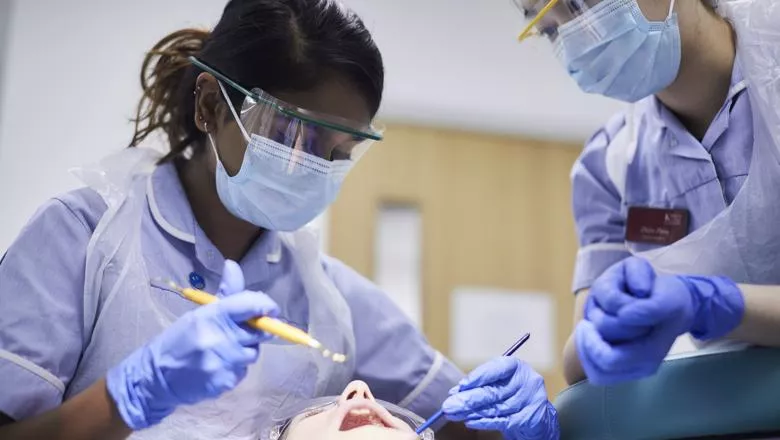I am incredibly proud of our submission and convey my thanks to everyone who contributed to the process. This was a huge amount of work which required a true collaborative ethos and effort - it spanned colleagues from across our academic and professional services, involving everybody from Principal Investigators to early career researchers, to research support officers and project administrators.
Professor Michael Escudier, FoDOCS Executive Dean
12 May 2022
REF 2021 results demonstrate impact of FoDOCS research
Results published today show combined strength of King’s profile for high-quality, impactful research within allied and applied health research, including dentistry.

The Faculty of Dentistry, Oral & Craniofacial Sciences welcome the results of Research Excellence Framework 2021 (REF2021). The results, released today, highlight the quality and positive impact of King’s research on global society.
REF 2021 is the UK’s system for assessing the quality of research in UK higher education institutions and is undertaken by the four UK higher education funding bodies. Outcomes from the REF provide accountability for public funding of universities and influence funding allocation.
Research from the Faculty was considered within Unit of Assessment 3 (UoA3), which covers research in Allied Health Professions, Dentistry, Nursing and Pharmacy. It is the second largest REF submission for King’s and encompasses colleagues from FoDOCS, Nursing, Midwifery and Palliative Care, FoLSM, and a small number from the NIHR Health & Social Care Workforce Research Unit, in SSPP.
King’s was the top rated university within UoA3 showing the combined strength of King’s profile for impactful research within allied and applied health research.
UoA3 research at King’s is defined by its collaborative nature, that it spans the whole life course, from birth to death and takes account of the whole person – mind and body. 76 researchers from FoDOCS submitted 154 papers and contributed two impact case studies to the UoA3 submission. This made up a third of the total number of researchers submitted, and a third of the paper outputs. The Faculty’s contribution and the outcomes below reinforce its position as a world-leader in dentistry, oral and craniofacial sciences, producing high quality research that spans discovery to clinical research.
King’s UoA3 submission was ranked an impressive 1st for the overall proportion of the submission rated 4*, 1st for the proportion of outputs rated 4* and 1st for the proportion of impact rated 4*. It is joint 1st with 12 other institutions for proportion of environment rated 4*. This UOA3 submission was also ranked 1st for GPA and power. Within King’s UoA3 submission:
- 55.6% of outputs were rated 4*, 92.1% of outputs rated 3* or 4*
- 86.4% of impact case studies were rated 4*, and 100% of impact case studies rated 3* or 4*
- 100% of environment rated 4*
- overall grade point average (GPA) is 3.64
- overall power ranking is 818.
(4* or 3* ratings mean that research is world-leading or internationally excellent.)
It's wonderful to see how well we have done, highlighting the quality research carried out in the faculty across the board, from understanding cell fate decisions to changing patient behaviour. A huge congratulations to everyone involved.
Professor Abigail Tucker, Dean for Research
Our two submitted Impact case studies are examples of the crucial impact the research we do here at FoDOCS has on care, practice, policy and society.
Faculty researchers and international partners enabled a paradigm shift in the prevention and treatment of tooth decay worldwide through the Global Collaboratory for Caries Management. Dental caries (tooth decay) is the most prevalent disease globally and constitutes a major challenge across the life-course. The King’s-led Global Collaboratory evolved into an international umbrella group leading the paradigm shift towards what is now known internationally as comprehensive Preventive Dental Medicine. Our impact was evidenced across several domains including operationalisation of international guidance; integration of clinical and public health strategies for caries control; facilitating shifts in policy and payment systems; and shaping and delivering Corporate Social Responsibility activity with industry.
FoDOCS researchers also achieved multi-faceted impact in the field of Erosive Tooth Wear (ETW). The 3rd most common destructive dental condition, ETW is often poorly recognised by both dentists and patients until complex, expensive treatment is needed. Together with the Erosive Tooth Wear Foundation, a King’s-led implementation charity, our international, Industry-Academic Partnership has facilitated the collection of epidemiological data to inform policy makers and guidelines; stimulated innovation, sales and Corporate Social Responsibility activities with multiple global companies. Our work helped dentists to recognise, prevent and manage ETW and raised awareness of prevention and treatment amongst patients and the public.
I am delighted that two distinctive Impact Case Studies from the Faculty were chosen to be submitted to REF by UoA 3. Both represent the outcome of the hard work over many years of a range of staff working with International partners to take the results of King’s rersearch and use it to make the world a better place by reducing the burden of common oral conditions and faciliating improvements in both health and healthcare.
Professor Nigel Pitts, Director of Dental Innovation and Impact
Overall, King’s maintained its position among the world’s best universities for research excellence and power, reflective of the depth of quality, breadth of research and the ways that research is benefitting society. King’s increased its percentage of world leading research (4* rated) to 55.1% and maintained its sixth position for ‘research power’. King’s has also been rated third in the UK amongst multidisciplinary institutions for impact, with 67.8% of its research impact rated outstanding. In addition, King’s was the top rated university in two Units of Assessment – Allied Health and Classics, with Chemistry achieving the highest score for impact and King’s Business School scoring among the top ten Schools in the country.
You can read more about the results across the university here. You can find out more about the impact of King’s research in Spotlight feature series.



